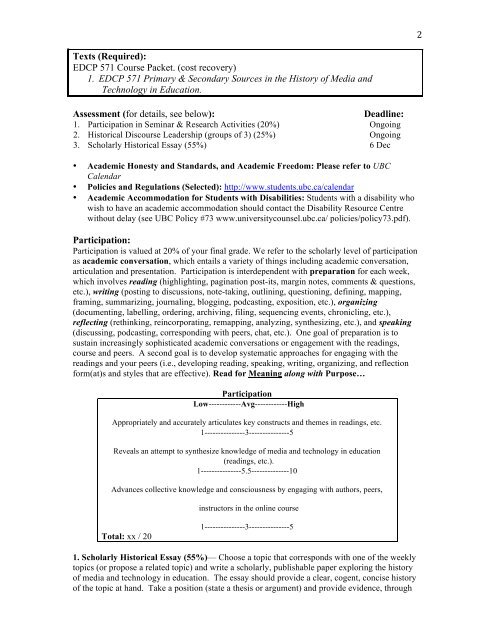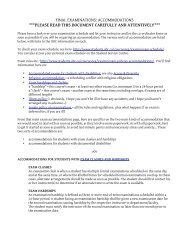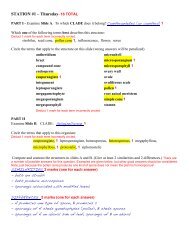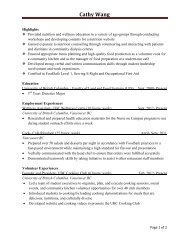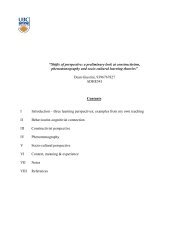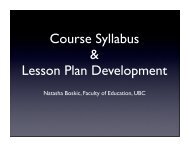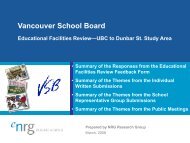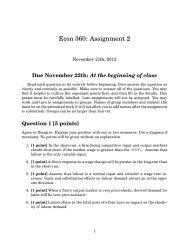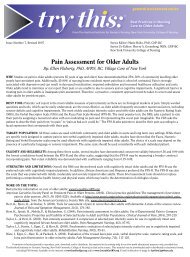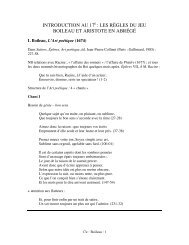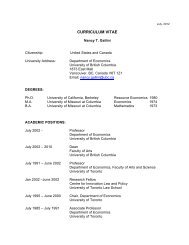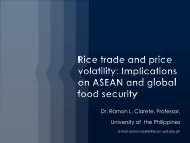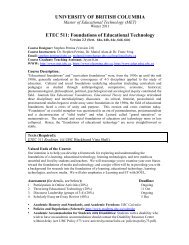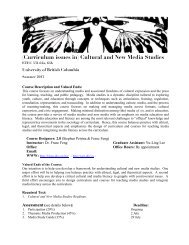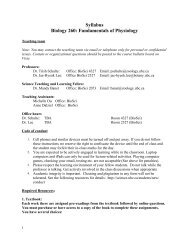History of Media and Technology in Education - UBC Blogs ...
History of Media and Technology in Education - UBC Blogs ...
History of Media and Technology in Education - UBC Blogs ...
Create successful ePaper yourself
Turn your PDF publications into a flip-book with our unique Google optimized e-Paper software.
2 <br />
Texts (Required):<br />
EDCP 571 Course Packet. (cost recovery)<br />
1. EDCP 571 Primary & Secondary Sources <strong>in</strong> the <strong>History</strong> <strong>of</strong> <strong>Media</strong> <strong>and</strong><br />
<strong>Technology</strong> <strong>in</strong> <strong>Education</strong>.<br />
Assessment (for details, see below):<br />
Deadl<strong>in</strong>e:<br />
1. Participation <strong>in</strong> Sem<strong>in</strong>ar & Research Activities (20%) Ongo<strong>in</strong>g<br />
2. Historical Discourse Leadership (groups <strong>of</strong> 3) (25%) Ongo<strong>in</strong>g<br />
3. Scholarly Historical Essay (55%) 6 Dec<br />
• Academic Honesty <strong>and</strong> St<strong>and</strong>ards, <strong>and</strong> Academic Freedom: Please refer to <strong>UBC</strong><br />
Calendar<br />
• Policies <strong>and</strong> Regulations (Selected): http://www.students.ubc.ca/calendar<br />
• Academic Accommodation for Students with Disabilities: Students with a disability who<br />
wish to have an academic accommodation should contact the Disability Resource Centre<br />
without delay (see <strong>UBC</strong> Policy #73 www.universitycounsel.ubc.ca/ policies/policy73.pdf).<br />
Participation:<br />
Participation is valued at 20% <strong>of</strong> your f<strong>in</strong>al grade. We refer to the scholarly level <strong>of</strong> participation<br />
as academic conversation, which entails a variety <strong>of</strong> th<strong>in</strong>gs <strong>in</strong>clud<strong>in</strong>g academic conversation,<br />
articulation <strong>and</strong> presentation. Participation is <strong>in</strong>terdependent with preparation for each week,<br />
which <strong>in</strong>volves read<strong>in</strong>g (highlight<strong>in</strong>g, pag<strong>in</strong>ation post-its, marg<strong>in</strong> notes, comments & questions,<br />
etc.), writ<strong>in</strong>g (post<strong>in</strong>g to discussions, note-tak<strong>in</strong>g, outl<strong>in</strong><strong>in</strong>g, question<strong>in</strong>g, def<strong>in</strong><strong>in</strong>g, mapp<strong>in</strong>g,<br />
fram<strong>in</strong>g, summariz<strong>in</strong>g, journal<strong>in</strong>g, blogg<strong>in</strong>g, podcast<strong>in</strong>g, exposition, etc.), organiz<strong>in</strong>g<br />
(document<strong>in</strong>g, labell<strong>in</strong>g, order<strong>in</strong>g, archiv<strong>in</strong>g, fil<strong>in</strong>g, sequenc<strong>in</strong>g events, chronicl<strong>in</strong>g, etc.),<br />
reflect<strong>in</strong>g (reth<strong>in</strong>k<strong>in</strong>g, re<strong>in</strong>corporat<strong>in</strong>g, remapp<strong>in</strong>g, analyz<strong>in</strong>g, synthesiz<strong>in</strong>g, etc.), <strong>and</strong> speak<strong>in</strong>g<br />
(discuss<strong>in</strong>g, podcast<strong>in</strong>g, correspond<strong>in</strong>g with peers, chat, etc.). One goal <strong>of</strong> preparation is to<br />
susta<strong>in</strong> <strong>in</strong>creas<strong>in</strong>gly sophisticated academic conversations or engagement with the read<strong>in</strong>gs,<br />
course <strong>and</strong> peers. A second goal is to develop systematic approaches for engag<strong>in</strong>g with the<br />
read<strong>in</strong>gs <strong>and</strong> your peers (i.e., develop<strong>in</strong>g read<strong>in</strong>g, speak<strong>in</strong>g, writ<strong>in</strong>g, organiz<strong>in</strong>g, <strong>and</strong> reflection<br />
form(at)s <strong>and</strong> styles that are effective). Read for Mean<strong>in</strong>g along with Purpose…<br />
Participation<br />
Low------------Avg------------High<br />
Appropriately <strong>and</strong> accurately articulates key constructs <strong>and</strong> themes <strong>in</strong> read<strong>in</strong>gs, etc.<br />
1---------------3---------------5<br />
Reveals an attempt to synthesize knowledge <strong>of</strong> media <strong>and</strong> technology <strong>in</strong> education<br />
(read<strong>in</strong>gs, etc.).<br />
1---------------5.5--------------10<br />
Advances collective knowledge <strong>and</strong> consciousness by engag<strong>in</strong>g with authors, peers,<br />
<strong>in</strong>structors <strong>in</strong> the onl<strong>in</strong>e course<br />
Total: xx / 20<br />
1---------------3---------------5<br />
1. Scholarly Historical Essay (55%)— Choose a topic that corresponds with one <strong>of</strong> the weekly<br />
topics (or propose a related topic) <strong>and</strong> write a scholarly, publishable paper explor<strong>in</strong>g the history<br />
<strong>of</strong> media <strong>and</strong> technology <strong>in</strong> education. The essay should provide a clear, cogent, concise history<br />
<strong>of</strong> the topic at h<strong>and</strong>. Take a position (state a thesis or argument) <strong>and</strong> provide evidence, through


